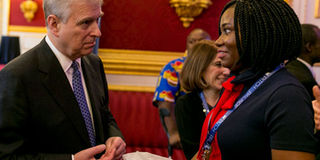Journalism graduate excels at engineering innovation awards

Nabulumba (Right) at a previous awards ceremony. Courtesy Photo
What you need to know:
Hindu Nabulumba, 25, studied journalism and communication at university but this has not stopped her from making scientific innovations. Recently in Nairobi her innovation - Yaaka Digital Learning Network - won her Shs40m at the Africa Prize for Engineering Innovation competition.
It is a hot afternoon when I make my way to Ggaba to meet Hindu Nabulumba, 25, a 2014 graduate of Journalism and Communication from Makerere University.
At about 5pm, I reach Ultimate Multimedia Consult offices in Ggaba and a young woman signals me into a dimly lit office.
Inside the office, I make myself comfortable in a maroon sofa before Nabulumba walks in breaking the silence with a “how are you” greeting.
This is Nabulumba’s office where she works with a group of young men and women on different projects.
“Let us restrict this interview to 30 minutes. I have to live for Nairobi tomorrow,” she tells me as we exchange pleasantries.
She looks confident but a little tensed up perhaps because she has to be on a Nairobi-bound bus the next day where she will be pitching her final presentation to judges to be part of the finalists in the Africa Prize for Engineering Innovation competition.
When we meet for the interview, it is before the competition where she goes on to emerge second runner up for her Yaaka Digital Learning Network innovation, a media platform that offers digital academic material.
As the third best, she walked away with €10,000 (Shs40m). The awards attracted participants from South Africa, Nigeria and Kenya with the winner walking away with a cash prize of €25,000 (Shs101m).
In 2014, Nabulumba and a team of young men and women at Ultimate Multimedia Consult embarked on a journey that would later give birth to Yaaka Digital Learning Network.
Yaaka, which loosely translates to light, is an interactive social networking tool that allows teachers and students to share academic knowledge and materials. The tool also allows teachers to remotely tutor students in a mutually beneficial way.
“While still at university, it was challenging to get content for the course units I studied. It would take me a lot of time and money,” she says, pointing to the origin of the innovation that is an academic resource, a job listing platform, a tutoring aid and a peer-to-peer knowledge sharing platform.
How the network was developed
The network was developed with the assistance of Gerald Businge, a multimedia journalist and communication specialist.
It can be used by students and trainers in universities, tertiary institutions, secondary schools, primary and pre-primary schools to train, mentor and share academic information on social and extracurricular content in the form of text, audio and video.
“Many students read for the purpose of passing exams but they never understand the content. The Yaaka platform enables students to understand what they are taught because the content is developed from the Ugandan syllabus,” says Businge.
Content from pre-primary to advanced level, Businge says, is easier to access because teachers are willing to provide it. However, he says, there is a challenge with university content because some lecturers have no systematic flow of content.
Access to the platform is free for registered users who access a multitude of courses owned by Ultimate Multimedia Consult with an option of buying or subscribing to courses put up by other teachers.
The major interface is conducted through the website where an application can be accessed via computers, smart phones, tablets and e-readers.
However, the challenge, according to Nabulumba, is the unreliable internet access, especially in rural areas. As a solution, a customised offline version has been developed for tablets to sidestep the challenge.
Access to content on the platform is enabled after a student has signed up and is provided with a confirmation through an email.
“Instructors have to apply and fill in their academic qualifications for quality control,” according to Nabulumba, who emphasises that access to eventually learning materials is free but they hope to make money through advertisement.
Future prospects
The Yaaka Digital Learning Network has already been launched with more than 35,000 registered users, according to Nabulumba and plans are underway to develop a Yaaka product for every African country in the near future.
“We plan to have more people using the platform and about four million people in Uganda by 2020, and to develop a Yaaka Digital Learning Network for 21 countries across Africa within three years,” she says.
Education background
Nabulumba went to Seeta Boarding Primary School before joining Lugazi Mixed School and Kawempe Muslim Secondary School. She later joined Makerere University where she graduated in 2014 with a Bacholor’s degree in Journalism and Communications. She has been involved in multimedia journalism since graduating, dealing mainly in developing documentaries, website designing and proposal writing. “I thought I would be a TV presenter but I found multimedia very interesting. It takes passion and an open mind to fit in,” she says.




